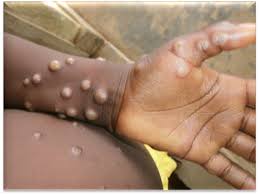Two years after a global outbreak, fears are growing over a new strain of mpox — formerly known as monkeypox — identified in the Democratic Republic of Congo (DRC) and several neighboring countries.
This deadlier and more transmissible strain, known as the Clade Ib subclade, has been spreading person-to-person in the DRC since September.
The World Health Organization (WHO) announced on Sunday that it is considering convening an expert committee to decide whether to declare an international emergency, as it did during the global mpox outbreak in 2022.
Unlike other strains where lesions and rashes are usually limited to the mouth, face, and genitals, the Clade Ib strain causes skin rashes across the entire body.
The African Union health agency, Africa CDC, reported 14,479 confirmed and suspected cases of the strain and 455 deaths in the DRC as of August 3, with a mortality rate of around three percent.
Authorities in four neighboring countries, including Burundi, which has reported 127 cases, have also confirmed mpox cases, although the specific strain has not been identified.
The eight-member East African Community (EAC) has urged governments to educate their citizens on how to protect themselves and prevent the spread of the disease.

